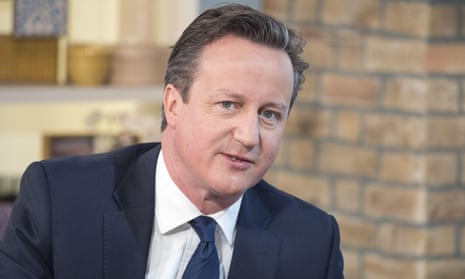David Cameron is committed to “breaking the link” between the European court of human rights and the supreme court to ensure the UK’s highest court remains the “ultimate arbiter of human rights”, Downing Street has said.
The prime minister’s spokeswoman moved to clarify No 10’s thinking amid reports that Cameron had ruled out a UK withdrawal from the European convention on human rights.
The Daily Telegraph reported on Monday that the prime minister had overridden objections from Michael Gove and Theresa May, who believe that pulling out of the convention may be the “only solution” to assert the supremacy of UK courts over the Strasbourg-based court.
Downing Street said the prime minister remains committed to two goals outlined in the Conservative general election manifesto: scrapping the Human Rights Act and ensuring that the UK supreme court would have the ultimate say over human rights in the UK.
The No 10 spokeswoman said: “The prime minister’s position on what needs to happen on human rights is set out very clearly in the Conservative manifesto. That is the approach that the whole government is behind. That is scrapping the Human Rights Act, breaking the link between the ECHR and here, and making the supreme court in the UK the ultimate arbiter of human rights in the UK.
“The prime minister’s focus here is on getting the rights put into a British bill of rights and making the supreme court, not the Strasbourg court, the one that decides on human rights in the UK ... The justice secretary is looking through these issues and working out the best way to take them forward.”
Gove has been forced to delay plans to scrap the Human Rights Act after it became clear to government whips that they would be overwhelmed by a Tory rebellion. The prime minister has been advised that he needs to abandon a “deeply offensive” threat to withdraw from the European convention on human rights if he is to win support of David Davis and Ken Clarke for his plans to repeal the Human Rights Act.
Senior Tories have told No 10 that Gove will have to embark on a major revision of Tory plans, outlined last year by his predecessor, Chris Grayling, to withdraw from the convention if parliament failed to secure the right to veto judgments from the European court of human rights. Gove is making clear that he regards the Grayling document as a starting point but is not bound by it. But he is saying he is bound by the Conservative general election manifesto.
The Tory manifesto said: “The next Conservative government will scrap the Human Rights Act, and introduce a British Bill of Rights. This will break the formal link between British courts and the European court of human rights, and make our own supreme court the ultimate arbiter of human rights matters in the UK.”
The European court of human rights upholds the European convention on human rights, which was drawn up in the wake of the second world war. David Maxwell-Fyfe, who later became lord chancellor, was one of the main authors of the convention.
The reports about the splits in government over Britain’s membership of the convention came after Nick Timothy, a former special adviser to the home secretary, called for a withdrawal from the convention.
Timothy wrote in the Sunday Telegraph: “A new bill of rights that incorporates all the original articles of the European convention – together with other traditional British rights such as the right to a trial by jury – would still be consistent with the Good Friday agreement. It would also allow parliament – rather than Strasbourg – to decide where the balance lies between different rights. It would allow British courts and British judges to decide where the balance lies between those rights in individual cases. It would mean the UK can protect the public and national security while still defending human rights. And it would mean we can escape what has become a de facto European constitutional court: the UK should withdraw from the European convention and the jurisdiction of the court in Strasbourg.”
Dominic Cummings, Gove’s former special adviser, blogged in response to the Daily Telegraph story: “The No 10 line that ‘Gove hasn’t made up his mind yet’ doesn’t make sense. Obviously only the prime minister can decide whether to withdraw from an international treaty, as removing the jurisdiction of the Strasbourg court requires. Gove’s job on the HRA is to punt it into the long grass then deliver a fudge that leaves Strasbourg in charge. The sensible thing for him to do is give this doomed project to a junior minister and focus on other priorities.”

Comments (…)
Sign in or create your Guardian account to join the discussion